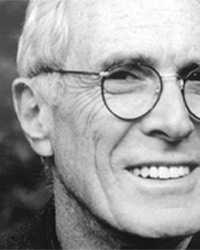|
Mark Strand |
|
No. 55 / Diciembre 2012-Enero 2013 |
|
|
|
Mark Strand |
|
The Mysterious Arrival of an Unusual Letter It had been a long day at the office and a long ride back to the small apartment where I lived. When I got there I flicked on the light and saw on the table an envelope with my name on it. Where was the clock? Where was the calendar? The handwriting was my father’s, but he had been dead for forty years. As one might, I began to think that maybe, just maybe, he was alive, living a secret life somewhere nearby. How else to explain the envelope? To steady myself, I sat down, opened it, and pulled out the letter. “Dear Son,” was the way it began. “Dear Son” and then nothing. La misteriosa llegada de una carta poco común El día había sido largo en la oficina y largo el camino de regreso al departamentito en que vivía. Cuando llegué prendí la luz y vi sobre la mesa un sobre con mi nombre. ¿Dónde estaba el reloj? ¿Dónde el calendario? La letra era de mi padre pero llevaba muerto cuarenta años. Como era de esperarse, empecé a pensar que tal vez, sólo tal vez, seguía vivo, que llevaba una vida secreta cerca de aquí. Si no, ¿cómo explicar el sobre? Para calmarme me senté, lo abrí y saqué la carta. “Querido hijo”, comenzaba. “Querido hijo” y después: nada. The Minister of Culture Gets His Wish The Minister of Culture goes home after a grueling day at the office. He lies on his bed and tries to think of nothing, but nothing hap-pens or, more precisely, does not happen. Nothing is elsewhere doing what nothing does, which is to expand the dark. But the minister is patient, and slowly things slip away—the walls of his house, the park across the street, his friends in the next town. He believes that nothing has finally come to him and, in its absent way, is saying, “Darling, you know how much I have always wanted to please you, and now I have come. And what is more, I have come to stay.” Al secretario de cultura le conceden su deseo El secretario de cultura va a casa después de un día extenuante en la oficina. Se acuesta en su cama y trata de pensar en nada pero nada pasa o, para ser exactos, nada no pasa. Nada está en otra parte haciendo lo que nada hace: extender la oscuridad. Pero el secretario es paciente y lentamente las cosas desaparecen –los muros de su casa, el parque de enfrente, sus amigos en otra ciudad. Cree que nada ha llegado finalmente a él y cree que le dice, a su modo ausente, “Querido, tú sabes cuántas ganas he tenido siempre de agradarte y ahora ya llegué. Es más: llegué para quedarme.” No Words Can Describe It How those fires burned that are no longer, how the weather worsened, how the shadow of the seagull vanished without a trace. Was it the end of a season, the end of a life? Was it so long ago it seems it might never have been? What is it in us that lives in the past and longs for the future, or lives in the future and longs for the past? And what does it matter when light enters the room where a child sleeps and the waking mother, opening her eyes, wishes more than anything to be unwakened by what she cannot name? No hay palabras Cómo ardieron esos incendios que ya no son, cómo empeoró el clima, cómo desapareció sin rastro la sombra de la gaviota. ¿Fue el fin de una estación, el fin de una vida? ¿Fue hace tanto que parece no fue nunca? ¿Qué es eso que de nosotros vive en el pasado y anhela el futuro o que vive en el futuro y anhela el pasado? ¿Y qué importa cuando la luz entra al cuarto en que duerme el niño y la madre despierta y al abrir los ojos quisiera más que nada que no la despertara lo que no puede nombrar? Mystery and Solitude in Topeka Afternoon darkens into evening. A man falls deeper and deeper into the slow spiral of sleep, into the drift of it, the length of it, through what feels like mist, and comes at last to an open door through which he passes without knowing why, then again without knowing why goes to a room where he sits and waits while the room seems to close around him and the dark is darker than any he has known, and he feels something forming within him without being sure what it is, its hold on him growing, as if a story were about to unfold, in which two characters, Pleasure and Pain, commit the same crime, the one that is his, that he will confess to again and again, until it means nothing. Misterio y soledad en Topeka La tarde se oscurece en noche. Un hombre desciende más y más profundo en la lenta espiral del sueño, en su corriente, en toda su longitud, atraviesa algo que siente como bruma y llega al fin a una puerta abierta por la que pasa sin saber por qué y sin saber por qué va a un cuarto en que se sienta y espera mientras el cuarto parece cerrarse sobre él y la oscuridad es la más oscura que ha visto y siente que dentro de él está formándose algo que no sabe qué es pero que lo sujeta cada vez más firmemente como si estuviera a punto de suceder una historia en la que dos personajes, Placer y Dolor, cometen el mismo crimen, que es el suyo, el que él confesará una vez y otra vez hasta que nada signifique.
|



